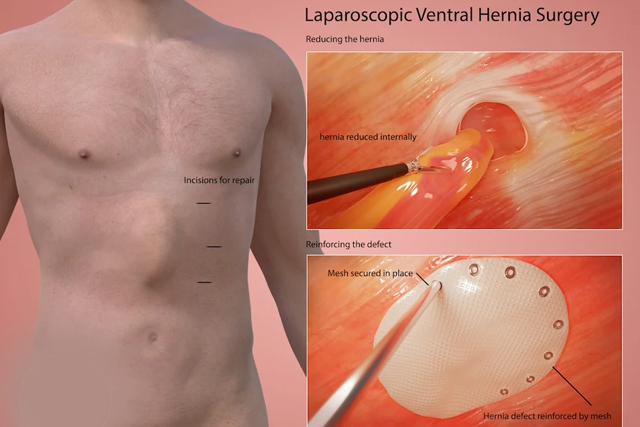Need expert incisional or ventral hernia repair in Bareilly? Dr. Om Kumar Sharma offers advanced laparoscopic IPOM, IPOM-Plus, and Preperitoneal Mesh Hernioplasty for durable results and faster recovery. Consult today. 080777 78055
Laparoscopic Incisional / Ventral Hernia Repair (IPOM, IPOM-Plus & Preperitoneal Mesh Hernioplasty) in Bareilly – Dr. Om Kumar Sharma
Advanced Laparoscopic Incisional & Ventral Hernia Repair in Bareilly | IPOM, IPOM-Plus & Preperitoneal Mesh Hernioplasty
Understanding Incisional and Ventral Hernias
Incisional hernias are a common type of ventral hernia that develop at or near a
previous surgical
incision site on the abdomen. They occur when the abdominal wall muscles, weakened by surgery, fail
to heal completely, allowing abdominal contents (like intestines or fatty tissue) to protrude
through the defect.
Ventral hernias can also occur spontaneously in other areas of the abdominal wall, such as umbilical hernias (near the navel) or epigastric hernias (above the navel).

These hernias can range in size from small to very large and can cause:
A visible bulge or swelling, especially when coughing, straining, or
standing.
Pain or discomfort in the abdominal area.
Nausea, vomiting, or digestive issues.
In severe cases, incarceration (trapping of tissue) or strangulation
(loss of blood supply to trapped tissue), requiring immediate medical attention.
If you suspect you have an incisional hernia or a ventral hernia in Bareilly, Dr. Om Kumar Sharma, an Advanced Laparoscopic Surgeon, offers specialized diagnosis and state-of-the-art repair options.
Advanced Laparoscopic Techniques for Incisional & Ventral Hernia Repair
Dr. Om Kumar Sharma specializes in minimally invasive laparoscopic techniques for incisional and ventral hernia repair, providing patients in Bareilly with effective solutions that lead to less pain, smaller scars, and quicker recovery compared to traditional open surgery. His expertise encompasses the latest approaches:
Laparoscopic Intraperitoneal Onlay Mesh (IPOM) Repair: This is a
widely adopted laparoscopic technique where the hernia defect is repaired by placing a specialized
mesh inside the abdominal cavity, directly over the hernia opening. The mesh acts as a bridge,
reinforcing the weakened abdominal wall. Dr. Sharma uses advanced coated meshes to minimize adhesion
to internal organs, a key concern with intraperitoneal placement.
Advantages of IPOM: Relatively
straightforward
technique,
allows placement of a large mesh, minimal need for extensive dissection of tissues, and often a
quicker operative time.
Laparoscopic Intraperitoneal Onlay Mesh Plus (IPOM-Plus)
Repair: An evolution of the standard IPOM, IPOM-Plus incorporates additional steps to
improve outcomes, particularly for larger or more complex defects. This often includes closing the
hernia defect with sutures before placing the mesh, providing a primary repair of the weakened
tissue in addition to the mesh reinforcement. This technique aims to reduce bulging and improve
long-term stability.
Advantages of IPOM-Plus: Offers
enhanced abdominal wall
reconstruction by closing the defect, potentially leading to better cosmetic results and reduced
risk of seroma (fluid accumulation) compared to simple mesh bridging.
Laparoscopic Preperitoneal Mesh Hernioplasty: This advanced
technique involves placing the mesh in the preperitoneal space, which is outside the abdominal
cavity but behind the abdominal muscles (similar to TEP for inguinal hernias). This approach avoids
direct contact of the mesh with the intestines, significantly reducing the risk of adhesions and
chronic pain sometimes associated with intraperitoneal mesh placement. It requires a higher level of
laparoscopic skill and dissection.
Advantages of Preperitoneal Mesh
Hernioplasty: Minimizes mesh
contact with viscera, potentially leading to lower rates of adhesions and chronic pain. Offers a
robust repair by placing the mesh in a more anatomical plane.
All these laparoscopic approaches utilize small incisions, through which a camera (laparoscope) and specialized instruments are inserted to perform the repair with precision and accuracy.
Why Choose Dr. Om Kumar Sharma for Your Ventral/Incisional Hernia Repair in Bareilly?
Repairing incisional and ventral hernias can be complex, often due to previous surgeries and scar tissue. Dr. Om Kumar Sharma's specialized training and extensive experience in advanced laparoscopic hernia surgery in Bareilly make him an ideal choice for your care.
Benefits of Laparoscopic Repair with Dr. Om Kumar Sharma:
Tailored Treatment: Dr. Sharma evaluates each patient's unique
hernia characteristics to determine the most appropriate laparoscopic technique (IPOM, IPOM-Plus, or
Preperitoneal).
Minimally Invasive Expertise: Enjoy the benefits of smaller
incisions, less post-operative pain, and reduced scarring.
Faster Recovery: Return to your daily routine, including light
activities, significantly quicker than with open surgery.
Shorter Hospital Stay: Many patients can go home the same day
or within a day or two.
Reduced Complications: Lower risk of wound infections and other
incision-related issues.
Durable Results: Meticulous mesh placement and technique aim
for long-term hernia recurrence prevention.
Experienced Hands: Dr. Sharma's proficiency with complex
abdominal wall reconstruction provides peace of mind.
Your Path to a Stronger Abdominal Wall
Your journey with Dr. Om Kumar Sharma for ventral or incisional hernia repair will be guided by comprehensive and compassionate care:
Thorough Evaluation: Including physical examination and
advanced imaging (e.g., CT scan) to assess the hernia size, location, and presence of adhesions.
Detailed Discussion: Dr. Sharma will explain the best surgical
options for your specific hernia, discussing the benefits and considerations of IPOM, IPOM-Plus, or
Preperitoneal approaches.
Expert Surgical Procedure: Performed with precision using
state-of-the-art laparoscopic equipment.
Personalized Post-Operative Care: Instructions for recovery,
pain management, and activity guidelines to ensure a smooth and safe healing process.
Ongoing Support: Follow-up appointments to monitor your
progress and ensure optimal long-term outcomes.
Leading Incisional & Ventral Hernia Specialist in Bareilly
Dr. Om Kumar Sharma is dedicated to providing cutting-edge, patient-focused care for individuals suffering from incisional and ventral hernias in Bareilly and the surrounding regions. His commitment to advanced laparoscopic techniques, including IPOM, IPOM-Plus, and Preperitoneal Mesh Hernioplasty, ensures you receive the best possible treatment for a lasting recovery.